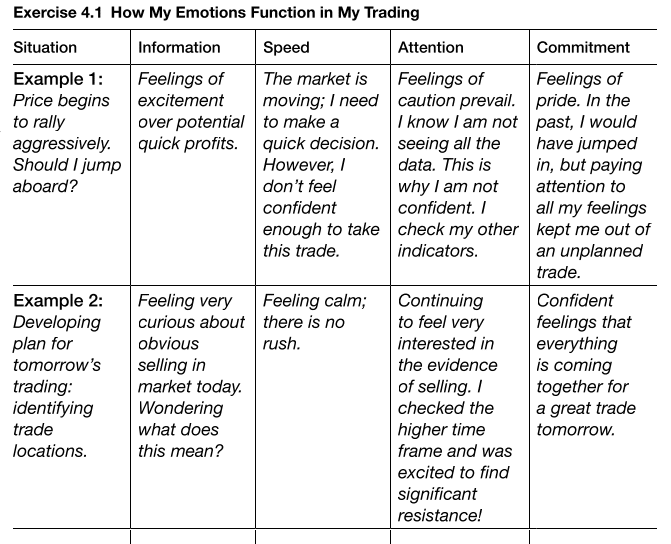
「Trade Mindfully」を読む(5)第4章
Chapter 4
The Necessity of Emotions in Trading
トレードにおける感情の必要性
事故で感情を司る脳の一部を損傷してしまった
フィニアス・ゲージ(Phineas Gage)の症例から
感情の欠如がもたらす問題点を指摘
左前頭葉の大部分を破損しながらも 無事生還
だがしかし
「もはやゲージではない」と友人・知人が言うほど
人格と行動の根本的な変化を及ぼす
死後
ハーバード大学医学部のウォーレン解剖学博物館に
寄贈されたゲージの頭蓋骨は
その後100年経って
前頭葉と情動と実際の意思決定の関係性を
実証するのに役立つ

A trade setup that has produced good profits in the past will be viewed with a positive feeling state in the future. The trader's current feelings will be triggered from associations connected with prior situations involving similar market conditions and will help guide the trader in selecting and executing the trade.
過去に大きな利益を生んだトレードのセットアップは、将来もポジティブな気持ちで見ることができる。トレーダーの現在の感情は、似たような市場状況を伴う過去の状況との関連から引き起こされ、トレーダーがトレードを選択し実行する際の指針となる。
If you removed emotions from the decision, however, you wouldn't know your preferences. Further, you would be unable to make an informed decision. As we will see clearly below, decisions made without emotional input result in poor outcomes. Emotions are an integral part of decision making. Because there is such a strong myth that traders need to trade without emotions, I want to help readers become very clear on this.
決断から感情を排除してしまえば、自分の好みがわからなくなる。さらに、情報に基づいた意思決定ができなくなる。後述するように、感情を排除した意思決定は悪い結果をもたらす。感情は意思決定に不可欠な要素なのだ。トレーダーは感情を排除してトレードする必要があるという神話が根強い。私は読者にこの点をはっきりと理解していただきたい。
There is a series of solid studies that, while not involving trading per se, involves tasks very much like trading where emotions are clearly shown to add to the quality of the decision and lack of emotional input leads to poor decisions and chaotic outcomes.
トレードそのものに関わるものではないが、トレードに非常によく似た作業を伴う一連の確かな研究があり、そこでは感情が意思決定の質を高め、感情的なインプットの欠如が誤った意思決定と混沌とした結果をもたらすことが明確に示されている。
The more seasoned traders also experienced emotions in their trading, including negative emotions. The researchers found that the more experienced and more accomplished traders were more willing to have negative emotions and didn’t let their emotions distract them from their pursuit of their long‐term goals. Some traders used their own emotions as a source of information about the emotions other market participants were experiencing as a way to inform their trades. Less experienced and less accomplished traders tried to avoid and eliminate their emotions by mentally attempting to control them or by behavioral responses designed to avoid them, such as trading with small positions after losses or removing themselves from trading by walking away from their trading desk when acute emotions were felt.The better traders were exercising emotional intelligence; they used the information their emotions provided to make better decisions. Less accomplished and less experienced traders acted without emotional intelligence. They tried to avoid, get rid of, and eliminate their emotions.
凄腕トレーダーたちは、ネガティブな感情を含め、トレードにおける感情を経験している。研究者たちは、経験豊富な凄腕トレーダーほど、ネガティブな感情を持つことを厭わず、その感情に惑わされることなく長期的な目標を追求していることを発見した。一部のトレーダーは、自分の感情を、他の市場参加者が経験している感情についての情報源として利用し、自分のトレードに役立てていた。経験の浅いトレーダーや実績のないトレーダーは、精神的に感情をコントロールしようとしたり、損失を出した後に小さなポジションで取引したり、急性的な感情が湧いたときにパソコンの前から立ち去ることでトレードから離れるなど、感情を回避するための行動によって、感情を回避し排除しようとした。優秀なトレーダーほどEQを発揮しており、感情から得られる情報を利用してより良い意思決定を行っていた。実績も経験も少ないトレーダーは、EQが低い行動していた。感情を避け、取り除き、排除しようとしていたのだ。
Pfister and Böhm’s four functions of emotions in decision making can assist a trader in identifying how their emotions operate and influence their decisions. This model can help the trader add a level of emotional intelligence to their trading.
PfisterとBöhmが提唱する意思決定における感情の4つの機能は、トレーダーが自分の感情がどのように作用し、意思決定に影響を与えるかを特定するのに役立つ。このモデルは、トレーダーが自分のトレーディングに感情的知性のレベルを加えるのに役立つ。
1.Information
Emotions provide information useful in understanding and appraising alternatives and options. As an example, emotions provide information when a trader identifies a choice trade setup. Feelings of heightened interest and excitement help inform our trade choice and shape the trade decision.
1.情報
感情は、選択肢やオプションを理解し評価するのに役立つ情報を提供する。例として、トレーダーがトレードのセットアップを選択するとき、感情は情報を提供する。関心の高まりや興奮の感情は、トレードの選択に情報を与え、トレードの決定を形成するのに役立つ事が多い。
2.Speed
Emotions can help us process information faster, giving the trader the ability to make decisions rapidly when time is a consideration. When in a short trade, for example, a trader sees her trade stall at support. Her feelings of apprehension that the market is no longer going down will help her to make a decision about the trade quickly, before price has an opportunity to rally against her position. The speed function also works in the opposite way. When a trader has only a little information on which to base a trade but knows it is a good trade and knows he must act quickly, it is his feelings—-honed by experience—-that can guide his actions to take the trade. In this way, emotions also provide a motivational function in trading decisions.
2.スピード
感情は情報をより速く処理するのに役立ち、トレーダーは時間を考慮する必要があるときに迅速な決断を下すことができる。例えば、ショートしているとき、トレーダーは自分のトレードがサポートで失速するのを見る。もう相場は下がらないという不安を感じることで、価格が自分のポジションに対して上昇する前に、素早くトレードに関する決断を下すことができる。スピード機能は逆にも働く。トレーダーがトレードの根拠となる情報をわずかしか持っていないが、それが良いトレードであり、迅速に行動しなければならないとわかっている場合、エントリーを後押しするのは、経験によって磨かれた感情である。このように、感情もまたトレードの意思決定において動機づけの機能を果たしている。
3.Focus & Attention
Emotions help us evaluate a situation by directing our attention to the data that is most relevant to the decision. For example, an experienced trader will see what appears to be an excellent trade on their chart. Although it looks ideal, unsettled feelings about the trade causes the trader to consider the higher time frame before taking the trade. Emotions direct the skilled trader's attention to the highly relevant background conditions of the market before they act to take a trade.
3.集中と注意
感情は、意思決定に最も関連するデータに注意を向けることで、状況を評価するのに役立つ。例えば、経験豊富なトレーダーは、チャート上に理想的なセットアップに見えるが、なにかしら居心地のよくない感情によって、上位足チャートを確認する。感情は、熟練トレーダーの注意を市場の環境認識に向かわせるのである。
4.Commitment
Emotions help us to commit to a decision and to stay with that decision once it is made. Here, feelings of confidence in the decision or the feelings associated with doing what is most important to the trader help her take action and sustain her decision. A trader may be struggling with cutting winning trades short, for example, and she feels the unpleasantness of anxiety while in a profitable trade. But it is her feelings of confidence in herself and her strong feelings of desire to become a competent trader who holds her winning trades that form her commitment to see the trade through, despite her other, unpleasant feelings of anxiety.
4.コミットメント
感情は、決断を下し、一度下した決断にコミットするのに役立つ。ここでは、決断に対する自信の感情や、重要な行動に出るという感情が、行動を起こし、決断にコミットする助けとなる。例えば、あるトレーダーが勝ちトレードを短期間で切り上げるべきか悩んでいるとしよう。しかし、自分に対する自信と、勝ちトレードを保持する有能なトレーダーになりたいという強い気持ちが、他の不快な不安の感情にもかかわらず、トレードをやり遂げるという決意を形成するのである。
(ケメコ注)
感情はトレード判断に不可欠
むしろ場合によってはとっても役に立つ
でもトレード判断あっての感情で
感情だけでトレードするのは危険
感情で頭が熱くなって心が乱れるのもダメ
When we are unwilling to have contact with our emotions, we tend to fight them. This is our “crude” and habitual reaction and it gives our unpleasant emotions additional strength. This is how we can become quickly overaroused and overwhelmed. When aroused and overwhelmed by our emotions, we can have difficulty in taking note of our somatic markers, logical thoughts, and rational perceptions about the market. We can become emotionally hijacked. It is as if one voice is screaming and we can't hear or even acknowledge other important voices in the crowd. As Lo, Repin, and Steenbarger found with day traders, hyperarousal overrides our normal ability to think rationally and respond to the market with care and consideration. High arousal leads to poor trading choices and inept trading actions.
感情との接触を望まないとき、私たちは感情と戦う傾向がある。これは「粗野」で常習的な反応で、不快な感情にさらなる力を与えてしまう。こうして私たちはすぐに過剰に興奮し、圧倒されてしまう。感情によって興奮し、圧倒されると、身体的な兆候や論理的思考、市場に関する合理的な認識に注意することが難しくなる。感情に乗っ取られてしまうのだ。まるで一つの声が叫んでいるようで、群衆の中の他の重要な声が聞こえないし、認識すらできなくなる。Lo、Repin、Steenbargerの3名のデイトレーダーに関する研究によれば、過度な興奮・過剰な感情は、理性的に考え、注意深く熟慮するという、市場に対応する正常な能力を上書きしてしまう。トレード上の誤った選択と的外れなトレード行動につながる。

